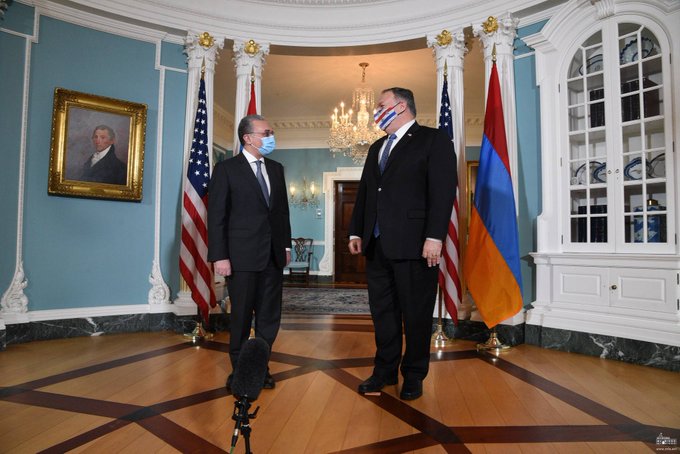Diplomatic efforts in Washington DC yielded seemingly fruitless results on Friday as Azeri forces continued to attack the civilian settlements of Artsakh.

Foreign Minister Zohrab Mnatsakanyan and his Azeri counterpart Jeyhun Bayramov held separate one-on-one, closed-door meetings with US Secretary of State Michael Pompeo to discuss the ongoing situation in Nagorno-Karabakh as missiles rained down on Artsakh’s capital of Stepanakert. Following his meetings, Secretary Pompeo tweeted that both sides must implement a ceasefire and return to the negotiating table within the framework of the OSCE Minsk Group. Minister Mnatsakanyan, for his part, briefed the US leader on Azerbaijan’s goal to resolve this issue through military means with the complete backing of the Turkish government. “Azerbaijan’s decision to turn itself into Turkey’s zone of influence and a hotbed of international terrorism is a serious threat to regional security,” read a statement from Armenia’s Ministry of Foreign Affairs. Mnatsakanyan also met with National Security Council advisor Robert C. O’Brien.
Day 27 of the conflict was marked by Azerbaijan’s sustained attacks on civilian settlements in Artsakh. At 2:20PM local time Azeri forces shelled the Karegah community of the Kashatagh region in Artsakh using BM-21 Grad multiple rocket launchers, as well as the road from Karegah to the village of Berdzor. Three shells landed in the Berdzor region. Soon after, Azeri forces bombarded the town of Martakert using military aviation.
As a result of the missile strikes by #Azerbaijan on Stepanakert, a gas pipeline supplying was damaged, a car was burnt, and nearby buildings and shops were destroyed. There are no casualties. pic.twitter.com/gqnmmI2pjn
— Artsakh / Karabakh Human Rights Ombudsman (@ArtsakhOmbuds) October 23, 2020
Stepanakert also came under heavy fire at night. Missile strikes damaged private property and critical infrastructure, including a gas pipeline. Martuni and the Avetaranots community of the Askeran region were also shelled throughout the night, causing significant material damage. One person was hurt in Avetaranots.
#Artsakh capital Stepanakert was yet again struck by the #Azerbaijan|i fighter jets. A residential house and the adjacent gas pipeline were damage pic.twitter.com/jXFDUY9Dgq
— Armenian Unified Infocenter (@ArmenianUnified) October 23, 2020
Along the Line of Contact (LoC), the Artsakh Defense Army was repelling attacks throughout the day. According to Ministry of Defense (MoD) representative Artsrun Hovhannisyan, efforts to neutralize subversive units of the Azerbaijani military conducting infiltration operations in the villages of Shekher and Jivanik near the center of the LoC were particularly intense. In the southern direction of the LoC, the Defense Army successfully pushed back an assault on the Vorotan river valley, destroying military equipment including nine armored vehicles and forcing soldiers to flee into the surrounding forests. One Azerbaijani soldier was captured and is receiving medical attention. Meanwhile, MoD Press Secretary Shushan Stepanyan reported that an Azerbaijani unmanned aerial vehicle was identified and shot down in the northeastern direction of Armenia.
Air Defense unites of the Republic of Armenia just shot down an enemy UAV in the northeastern direction of Armenia. pic.twitter.com/oNI2UmBZk5
— Shushan Stepanyan (@ShStepanyan) October 23, 2020
In a scathing report after spending time on the ground in Nagorno-Karabakh examining exploded munitions and conversing with witnesses, investigators from Human Rights Watch (HRW) say they observed Azerbaijan’s repeated use of internationally banned cluster munitions on residential communities in four separate incidents. “Cluster munitions should never be used by anyone under any circumstances, much less in cities, due to the foreseeable and unacceptable harm to civilians,” said HRW’s Stephen Goose. The NGO says it has pledged to investigate the conflict from both sides but has been denied similar access to on-site investigations by Azerbaijan.
At the same time, Genocide Watch has declared the situation a “Genocide Emergency” and considers Azerbaijan at stages nine and ten of the ten stages of genocide, specifically extermination and denial. Based on its report and current critical conditions, Genocide Watch recommends that the United Nations (UN) Security Council immediately demand an end to Azerbaijan’s attacks against Artsakh, order a ceasefire and impose an arms embargo against Azerbaijan. In addition, the UN Secretary-General and the OSCE Minsk Group must work to “resolve the conflict” and a UN Peacekeeping Force should be created and deployed to deter further attacks by Azerbaijan.
As Genocide Watch also calls on world leaders to “condemn hate speech and genocide denial by the Aliyev regime,” its partner Turkey is on notice for possible terrorist attacks against Americans in the country. Amid credible reports received by the US Mission in Turkey of potential attacks and kidnappings, US citizens and foreign nationals are being advised to exercise extreme caution, avoid crowds and maintain a “low profile.”
In Turkey, HDP Parliamentarian Garo Paylan is sounding the alarm again over an increase in hate speech and threats against Armenians in the country due to the hostilities between Azerbaijan and Artsakh. Paylan has been a target himself due to his calls for a ceasefire. “We can conclude that there will be no favorable results from this war–which has caused loss and destruction on both sides—and that the solution is on the peace table,” Paylan said in a Facebook post today.
Meanwhile, Artsakh President Arayik Harutyunyan issued a lengthy bilingual plea to his Russian counterpart to “exert all possible efforts to end the war.” Harutyunyan noted President Vladimir Putin’s objective statements earlier this week and recalled Russia’s decisive role in brokering a ceasefire back in April 2016.
The post Human rights violations in Artsakh persist amid diplomatic efforts appeared first on The Armenian Weekly.